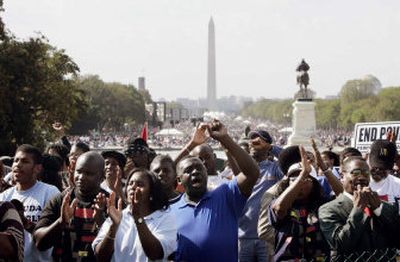Millions More turnout smaller, more inclusive

WASHINGTON – Under a bright autumn sky, thousands of African American men, women and children converged on the nation’s capital to mark the 10th anniversary of the Million Man March and launch a long-term movement to tackle poverty and racial inequality nationwide.
The Millions More Movement, called by Nation of Islam leader Louis Farrakhan, was a more inclusive successor to the 1995 march that brought together hundreds of thousands of black men on the National Mall for a “day of atonement.”
With the racial and economic disparities highlighted by Hurricane Katrina, the gathering included women, gays, Latinos and Native Americans. Still, it remained a largely African American affair and lacked the turnout of the Million Man March.
Neither police nor organizers would provide a crowd estimate, but it seemed clear attendance fell far short of the hundreds of thousands at the march a decade ago. But in a 75-minute speech, Farrakhan said the rally should not be measured by numbers but by the societal changes it spurs. “The meaning of this day will be determined tomorrow by what we do to create a real movement,” he said.
Farrakhan delivered a withering critique of the federal government’s response following Hurricane Katrina and of the Bush administration’s handling of the war in Iraq, adding: “I think we need a regime change in the United States of America.”
He called for a class action lawsuit against the Department of Homeland Security and the Federal Emergency Management Agency on behalf of Katrina victims.
“For five days, the government did not act. Lives were lost,” he said. “I firmly believe that if the people on those rooftops had blond hair and blue eyes and fair skin, something would have been done in a more timely manner. We charge America with criminal neglect.”
Farrakhan also promoted his message of self-help and asked each person in the crowd to contribute $1 per week to a Millions More Movement Disaster Relief Fund for use in rebuilding the Gulf Coast and defraying the education costs of 400 college students uprooted by the storm who now attend Howard University in Washington.
Throughout the day’s 12-hour program, dozens of speakers took the microphone to speak, recite poetry and sing. Among them were civil rights activist Jesse Jackson, former presidential candidate Al Sharpton and hip-hop mogul Russell Simmons.
Jackson recommended that people work toward change in their communities as a way to vent their frustration about the aftermath of Katrina.
Despite past anti-gay statements, Farrakhan met demands from the National Black Justice Coalition, a gay civil rights group, for the inclusion of an openly gay speaker and invited the coalition’s board president, Keith Boykin, to speak. He did not address the rally, however, because the program manager, the Rev. Barbara Skinner, refused to admit him to the stage area and told him he was not listed on the program.
While the 1995 march was criticized for falling short of its potential to uplift the masses of black men, some Million Man March attendees who had returned with their wives, sons and daughters were optimistic that the Millions More Movement could bring about systematic change.
“I didn’t bring my son the last time and I wanted him to experience the feeling that woke me up, that made me look at myself,” said Sam Langford, 37, of Richmond, Va. “It jump-started me. I hope a lot of people get that feeling.”
Stacey Jackson, whose 19-year-old son was killed in a drive-by shooting, came from Philadelphia with an organization that works to end gun violence.
“We’re losing too many of our children,” said Jackson. “I hope today isn’t the end. Let’s go back and get our communities together.”